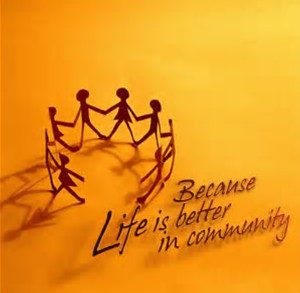Rev. Jana Purkis-Brash – February 5, 2017 – Isaiah 58: 1-12
As we as a faith community think together about what life in community means for us, I share with you this quote from a favorite author/thinker, Eugene Peterson . He says, “There can be no maturity in the spiritual life, no obedience in following Jesus, no wholeness in the Christian life, apart from an immersion in, and embrace of, community. I am not myself by myself.”
. He says, “There can be no maturity in the spiritual life, no obedience in following Jesus, no wholeness in the Christian life, apart from an immersion in, and embrace of, community. I am not myself by myself.”
Each of the Old Testament passages for this month, Isaiah, Deuteronomy, Leviticus, Exodus speaks about God’s intentions around our living in community. This month we will explore what it means to live and serve as God’s people not just as individuals but also in community.
Looking about him at the needs of the homeless, the hungry and the oppressed, Isaiah could no longer keep still. The self-indulgent displays of sackcloth and ashes, he declares, are not acceptable to God! The only true way to observe a fast is by liberating the oppressed, sharing your bread with the hungry, and opening your own house to the homeless!
So let’s go right to the Isaiah text and examine it in a few different ways. At the literal level, and this may be the only time you ever hear me talk about a Bible passage literally, this passage is a prophetic encouragement to the people of God (1) to actively do justice for the oppressed and (2) to show mercy to the most vulnerable. The prophet lists these most vulnerable as the hungry, the homeless, and the naked, all of whom, he says, are “your own flesh.” By this last phrase the prophet relies on the teaching of ;Genesis. 1 and 2 all humans are bone of each-other’s bones and flesh of each-other’s flesh. The prophet understands that all humans are family, for we share a common ancestor. For the prophet, it is only sin that keeps us from acknowledging that we are family, and living as family.
 The prophet says that doing such acts of justice and mercy will result in the rapid healing of the people of God. It will result in a renewed and improved relationship with God, in which God’s people communicate with God freely: “Then you shall call, and the Lord will answer; you shall cry, and he will say, Here I am.” God’s people will experience God’s presence.
The prophet says that doing such acts of justice and mercy will result in the rapid healing of the people of God. It will result in a renewed and improved relationship with God, in which God’s people communicate with God freely: “Then you shall call, and the Lord will answer; you shall cry, and he will say, Here I am.” God’s people will experience God’s presence.
To ponder an allegorical sense of this scripture, think of Christ’s own example of doing justice and mercy. This passage gives the people of God in the Old Testament an early glimpse of the heart and way of Jesus Christ, and it refreshes our vision of the same. In Jesus’ life and ministry we see him feed the hungry, defend the oppressed, he stands up for women’s right, he loves the outcast, the despised, the rejected, and the sinner, and calls on the rich and powerful to give their money to the poor. Similarly, by sharing in Christ’s merciful self-offering, we share in his merits, most especially in the eternal life he has merited.
With an eye to the moral sense of this passage, we find it right on the surface: we must do the works of justice and mercy the Lord’s prophet tells us to do, using Jesus as our example: both in the things Jesus himself did in the flesh, and in the ways Jesus’ way is multiplied before our imagination by the Christ-patterns of the saints.
Finally in the anagogical sense: Surprisingly, the inspired prophet says “your light will break forth like the dawn.” God’s light becomes our light, for the Church is betrothed to Christ. When we do acts of mercy and justice, we genuinely participate in the eternal and intelligible light who is the Holy Trinity.
Acts of justice and mercy, because they are acts of love, allow us to partake in the divine nature. Acts of justice and mercy are acts of worship, by which we glimpse the comforting presence of the Father, Son, and Holy Spirit: we sense that “the glory of the Lord” is our “rear guard.” God protects us, and we glimpse God’s glory (behind us, guiding & protecting us) out of the corner of our eye, though we do not yet see God face to face. We should not miss the opportunity to give acts of justice and mercy to all, especially those in need; for we are most in need ourselves, and God has given us mercy and justification. St. Gregory Nazianzus reminds us that Christians do not just have altars inside church buildings; anytime we see a beggar, there is God’s altar, awaiting our offerings. Continue reading “Life in Community”
